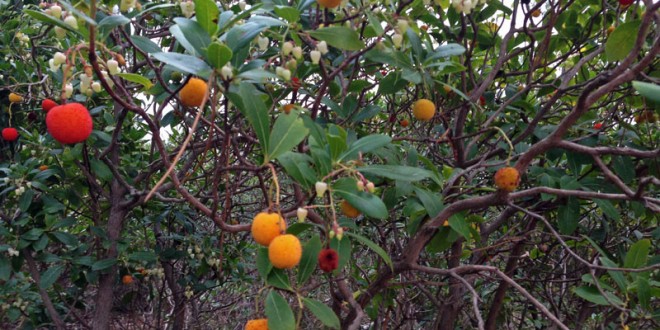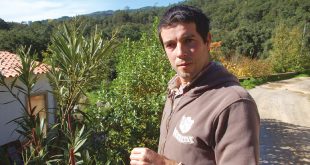A short travel diary in three acts, many trains and with hundreds of strawberry tree fruits
My journey is to take me from the island of Vilm on the German Baltic coast through the whole of Western Europe to the most southerly part of Portugal, in 48 hours. How can that work out well? My ferry ticket and my seven railway tickets speak a simple language; they say: you will board the ferry on misty Vilm, and then change four times, sleep for quite a long time, then change twice, sleep again, change, and … get off in the sunny Santa Clara Saboia! This is a challenge I am happy to accept.
Act 1 – Slow travelling
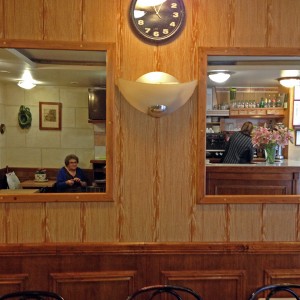
Actually, it isn’t so surprising that that this slow version of travelling by train is not only ecological but also so agreeable that it could easily have gone a bit further – if the Algarve wasn’t already the extreme southwest tip of Europe. After that, there’s only Portimão, and then the sea. But I’m getting ahead of myself: in Paris I use the three hour wait to drop into my favourite café from my student days for a coffee, “Le Carrefour” in the Quartier Latin run by Paulette who has actually already retired. Carrefour means “crossroads” in French. I’m interested to see what happens.
The moment I step into the Spanish Basque country in Irun in the early evening, and am greeted by a sticky warmth and pouring November rain, I start to feel in a holiday mood, just like pressing a button. Just the atmosphere in the night train feels charmingly strange to me, not to say exotic: the bar, for example, has an incredibly long counter at which the jovial Portuguese barman only wants to serve his guests red wine by the bottle (“Vasos nao temos, solo meia botelha o gran botelha”) and sings merrily in the process. Nice.
The night on the Portuguese night train, however, passes somewhat less comfortably in the top bunk in a four-person compartment than on its German counterpart from Berlin to Paris; somehow… bumpier. Alexander from Belgium, my sentimental companion in the neighbouring bunk, is a train driver no less. He explains the bumpiness to me: the axles on Portuguese trains are built with single rather than double suspension systems, such that the unevenness of the rails is transmitted one to one into the carriages, and thence into our pillows. What’s more, this can also be sensed acoustically from the fact that there is only a monosyllabic “tamm…” to be heard when a carriage crosses onto a new stretch of rail, rather than the usual “ta-tamm, ta-tamm…”.
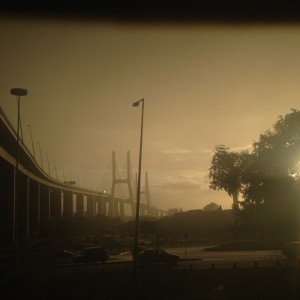
Being shaken around doesn’t worry me any more to start with, because the eloquent, passionate railway man with his leather suitcase and an old-fashioned, single-lens reflex camera round his neck spends the whole evening telling me about the decline of the European railways; of the time when you were given a single ticket at the counter and could travel through the whole of Europe twice as fast as today. He tells me about his bad conscience because his colleagues are on strike while he’s enjoying a holiday. We give voice to our regrets about the subsidies of aviation fuel, dream about a Transeurope Express, forget the time and…
… wake up just outside Lisbon where the sunrise casts the 25-kilometre-long Vasco da Gama bridge in a dramatic light.
Act 2 – The two sides of the paper medal
I had already heard about the rampant eucalyptus frenzy on a trip to Argentina; but here on the last leg of the train journey from Lisbon to Santa Clara/Saboia, during the last 100 kilometres, there’s an unusual sight: the plantations grow on terraces especially cut into the red stone. I wonder about this, trying to make myself feel better: aren‘t these terraces also useful structures against soil erosion? And can something that smells so good really be so bad? As I was to learn later, there is nothing good to be said about this imported plant: it draws every bit of water and nutrition away from every living thing, acidifies the soil and, after 30 years of intensive planting, leaves nothing but scorched earth, both figuratively and literally, as these trees apparently act like fire accelerants.
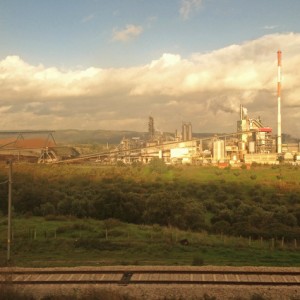
But I don’t get my own practical experience of eucalyptus until my first walk from near the upland village of Monchique – the first stop on my Portugal trip – to the peak of Picota. This leads me gently up the slope along a narrow path, a spring in my step as I pass stone pines, cork oaks and strawberry trees, each and every one of which has succeeded in tempting me to pick and munch on the reddest and sweetest of all the fruits from its branches. It is full of life here: for example, I see the first fire salamander in my life! There’s twittering everywhere, and splashing and glugging. The last serious forest fire of 2003 would be almost invisible to the layman were it not for the charred stumps of pine trees that stand there from time to time.
Quite different as I climb above 550 metres and reach the dense eucalyptus forest. Without the rustling of the leaves, there would be dead silence. The birds too have disappeared without trace, not an animal stirs any more, hardly an insect. Oppressive.
As it is not long till sunset, I quickly tackle the remaining 200 metres in height to the top of Picota. The cold, gusty wind hardly allows me time to enjoy the view and drives me back into the eucalyptus wood, which at least offers me shelter from the wind and the necessary security for my small camp. The sticks that are wet from the rain won’t burn properly to start with so I get double the pleasure out of finding a second use for the packaging of my emergency rations and consume the contents – a huge portion of alfarroba cake made of carob flour, figs and marzipan – in bliss. The flames blaze, the stars twinkle between the branches. And when the moon rises casting a bright light, I’m already asleep.

Act 3 – Lisbon
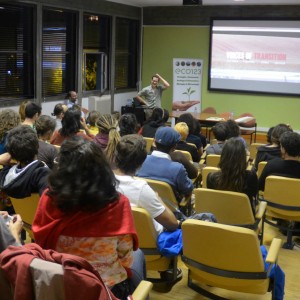
The first actual stop on the tour to show my film “Voices of Transition” takes me to Lisbon. Many things combine here which could make me feel that this is love at first sight: my weakness for hilly, maritime ports in general, my special penchant for cobbled streets and winding lanes in particular… but instead of heading straight for the old town with its aromas of salt-cod and freshly washed clothes, I make my way first to an amphitheatre in the Faculty of Sociology on Campo Grande. That’s where I am received before the evening begins by Gil Penha-Lopes, the brilliant, exuberant lecturer and activist (sic!), and by the student permaculture gardeners, who have, very strategically – right next to the terrace of the student café – planted an edible cultivated landscape: each “bica” (coffee) that is drunk here is accompanied free of charge by a view over kiwis, olive trees and the scent of lavender!
As the concept of the “academic quarter” (the fifteen minutes difference between the scheduled and the actual starting time of lectures at a German university) seems in general to be given a somewhat more generous interpretation in Portugal, I use the extra quarter of an hour before the film starts to study the guests who are gradually filling up the hall. Most of them are between twenty and their mid-thirties, some are already active in the movement, some have come from far away. Something connects everyone with nature; something even connects two of them with a Belgian train driver who guided them here!
The film is received with enthusiastic applause, by which I am very moved. But it shows that the “Voices of Change” with their pragmatic, positive transition philosophy also finds resonance here. And that they can encourage people here to make a new start by building up a local, ecological economy in order to inject new energy into a country that is completely drained and demoralised by the neo-liberal austerity policy.
One of the many questions afterwards is the most personal: how did it happen that you wanted to make this film at all? I tell them about my inspiring encounter with permaculture 12 years ago, about my own painful experience of land grabbing in an Argentina ruled by agribusinesses and finally about how difficult it was to drive this hopelessly underfunded project forward for so many years until it was complete.
If you like, you can compare making a film with the distillation of “medronho” brandy. You choose the best stories (fruits) and allow these to condense by sweating through sleepless nights, until at last you are left with an essence that is as spirited as possible, with which you can set things in motion (or clink glasses)? To our health, Portugal: may the transition spirits emerge from the bottle and initiate good things!
PS: The next stop with the film is the small town of Fundão. I have been told that there isn’t a transition initiative there yet: who knows what “Voices of Transition” will set in motion there?
 Eco123 Revista da Economia e Ecologia
Eco123 Revista da Economia e Ecologia

